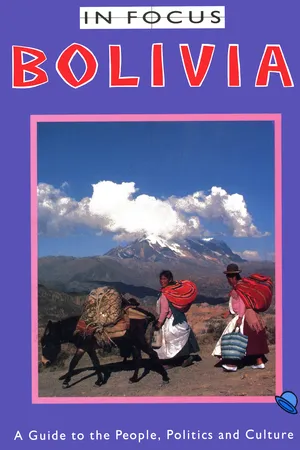Bolivia in Focus
About this book
Often caricatured in Europe and the US as the land of coups and cocaine, Bolivia is a country full of rich traditions stemming from before the arrival of Columbus. In the most Indian of Latin American nations, pre-Conquest lifestyles, languages and dress have adapted to survive centuries of oppression and forced labour in the silver and tin mines which dot the landscape. Bolivia In Focus is an authoritative and up-to-date guide to this fascinating land. It explores: The history: Life under Spanish rule; the impact of independence and war; the revolution of 1952 and military intervention in politics.Politics and the economy: Political parties, trade unions and the military; the rise of independent grassroots movements; free market reforms and the collapse of mining in the 1980s; coca and cocaine production.People and society: Migration to the cities and the increasing influence of Brazil and Argentina; the fight to regain access to the sea.Culture: The Indian identity; the indigenismo movement; music and religion; media and censorship.Bolivia In Focus is the second in a series of guides covering the countries of South and Central America and the Caribbean.
Tools to learn more effectively

Saving Books

Keyword Search

Annotating Text

Listen to it instead
Information
Table of contents
- Title Page
- Copyright Page
- Table of Contents
- Introduction
- 1: History
- 2: The New Bolivia
- 3: Economy and Society
- 4: Culture
Frequently asked questions
- Essential is ideal for learners and professionals who enjoy exploring a wide range of subjects. Access the Essential Library with 800,000+ trusted titles and best-sellers across business, personal growth, and the humanities. Includes unlimited reading time and Standard Read Aloud voice.
- Complete: Perfect for advanced learners and researchers needing full, unrestricted access. Unlock 1.4M+ books across hundreds of subjects, including academic and specialized titles. The Complete Plan also includes advanced features like Premium Read Aloud and Research Assistant.
Please note we cannot support devices running on iOS 13 and Android 7 or earlier. Learn more about using the app
